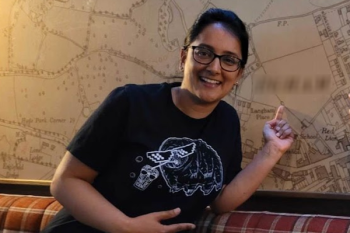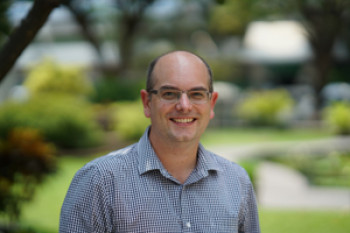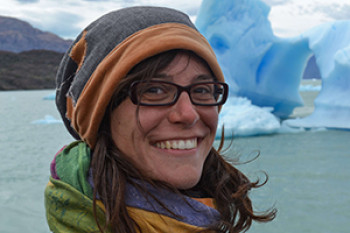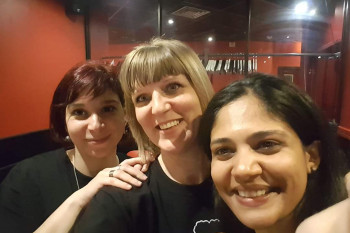© Pint of Science, 2025. All rights reserved.
In our 5 questions series we talk to our Pint of Science Country Directors. Today we meet Dr Lisa Recnik who runs Pint of Science Austria.
1. What’s your background, who are you?
I’m a chemist. I got interested at school when I realised how chemistry is just building up everything around us. And I found it even more fascinating when I learned how even biological processes can be explained on a molecular level: you just have to have your proton in the right place! :D Since the early beginnings of my research I want to use my chemistry knowledge to solve biological questions. After my adventures abroad, I’m now back for a postdoc in my hometown Vienna where I’m working on peptides labelled with radionuclides, how cool is that? :)
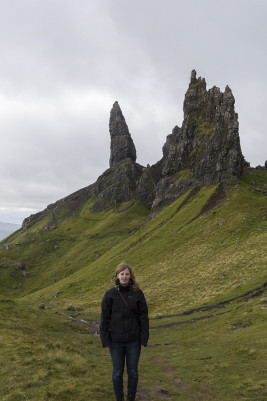
2. How did you hear about Pint of Science and what made you decide that you needed to bring this to your country / run this nationally?
I first read about them in a university newsletter when I was in Bristol, UK for my PhD thesis. I wasn’t really sure what to expect but I joined to help organising it and I loved it immediately! When I moved to France a couple of years later, I was glad to see that it also existed in my new home town. And when I came back to my ville natale in 2019, I had to bring the festival with me. After so many years it started to be part of me. Why do I like it so much? Apart from the great concept and all the people that I’ve met through it (some of them I have to call best friends now!), it is the atmosphere on the evenings of the festival: it is so inspiring and motivating to see how all the effort you put into it works out and people enjoy to hear about science! It is about passing on my passion about science to others.
3. What has been the biggest challenge you’ve faced in Pint of Science?
My biggest challenge is happening right now, when I decided to bring Pint of Science to Austria all by myself. I haven’t been in the country for over six years, so I didn’t know anyone of the science communication community and I didn’t have a lot of contacts in research here anymore. I needed to build up everything from scratch (and still am!) and I also had no idea about how to run this festival on a national level. But I’m learning a lot and I enjoy every bit of it. Also, I was very fortunate and I found a motivated team with lots of ideas and we are so excited for #pint20 to happen in Austria!
4. Tell us about a Pint of Science event or experience that really moved you and why?
For me the best experience is all the people you meet and the stories they tell you. It’s just so inspiring to see the creativity of researchers when they promote their work and also the reaction of the public when they engage with it. One of those moments was an event in Bristol. The topic of the evening was the look of dinosaurs and we had a palaeontologist talking about how he found out what one species of dinosaurs looked like, their feathers, their colour and so on. In the second part there was a palaeo-artist who explained how he used the information from the researcher to build up a life-size model (the dinosaur was the size of a medium-sized dog, no TRex :D ). At the very end of the evening - as a surprise to all of us - he showed us the real model that he created, and all the people in the room jumped up from their chairs to storm towards the stage and have a look at the dinosaur. You could feel the excitement in the air, it was amazing :)
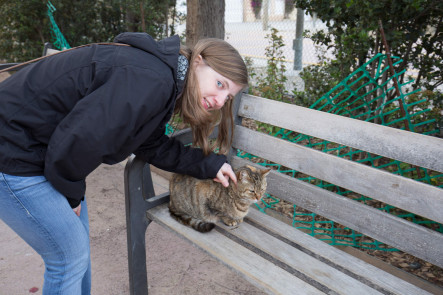
5. What’s your favourite science subject and which drink would you pair it with ?
That’s a tough one! Not sure if I’d go for evolution or the mechanism of ATP synthases. Actually they are kind of linked: for me it really is mind-blowing how a hot soup of some simple molecules in water could evolve so far to give an enzyme that is encoded by DNA, build up by other enzymes and then sits in a cell membrane, harnesses the potential of an electrochemical gradient (of protons) in order to fuel the rotational motor of the enzyme, a machine that is responsible for transforming ADP to ATP, the energy currency of our cells of all organisms. OK, that was one long sentence but when I start thinking about it, I just can’t stop. Without ATP I wouldn’t be sitting here breathing, and it all comes down to a little enzyme that uses the difference of proton concentrations. As I said earlier: you have to have your proton in the right place!
Drinks that go with it? Obviously everything which helps you to synthesise ATP :p but I prefer a good glass of dry white wine, for example Gemischter Satz from the vineyards in Vienna.
Bonus question : what do you do in your free time ?
I love to read even though I don’t always find the time for it. And I like to go to the cinema but not those big blockbusters. I like board games and baking. And I love the mountains in summer and in winter - obviously, because I’m Austrian. :)
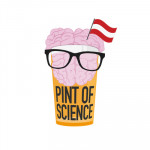 Pint of Science Austria can be found at pintofscience.at
Pint of Science Austria can be found at pintofscience.at
